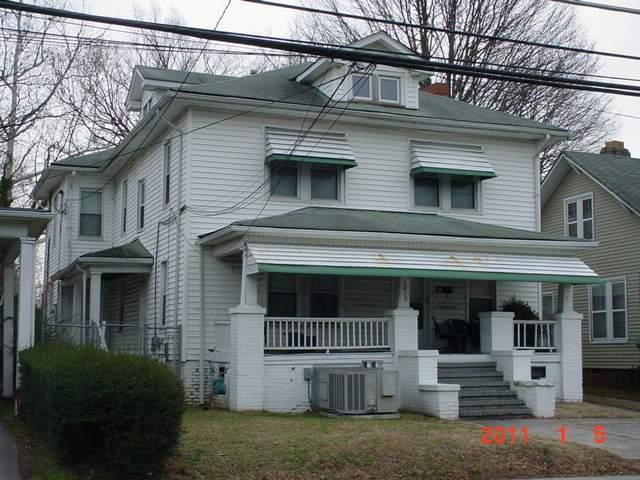This two-story, hip-roofed Foursquare house is three bays wide and triple-pile. The house has a painted brick foundation, vinyl siding and windows, and an interior brick chimney. It has two gabled dormers, one on the façade and one on the north elevation; each has a pair of single-light replacement windows. The hip-roofed front porch is supported by tapered wood posts on painted brick piers and retains an original wood railing and brick stair with painted brick knee walls. A hip-roofed side porch on the north elevation has tapered wood supports and shelters two entrances, one to the main block of the house and one to the two-story, hip-roofed rear ell on the northeast corner of the house. There is a one-story, hip-roofed rear ell on the southeast corner and a two-story, shed-roofed block between the ells. County tax records date the building to 1923; the earliest known occupant is Reverend S. L. McDowell in 1925; it is currently two or three units.
Garage, c. 1960 – This hip-roofed, concrete-block garage has metal overhead door.
(The information below in italics is from the Preservation Durham Plaque Application for the White Rock Baptist Church Parsonage)
This residence was built in 1923 by White Rock Baptist Church to be their parsonage. The parsonage located at 1219 Fayetteville Street is located in the southern and southeastern part of Durham in a community that became known as Hayti. The earliest occupant was Reverend S.L. McDowell who resided there from 1924 to 1933. This two-story, hip-roofed Foursquare house is three bays wide and triple pile. The house has a painted brick foundation, and an interior brick chimney. It has two gabled dormers, one on the fasçade and one on the north elevation; each has a pair of single-light windows. The hip-roofed front porch is supported by tapered wood posts on painted brick piers and retains an original wood railing brick stair with painted brick knee walls. A hip-roofed side porch on the north elevation has tapered wood supports and shelters two entrances, one to the main block of the house and one to the two-story hip-roofed rear ell on the northeast corner of the house. There is a one story hip-roof rear ell on the southeast corner and a two-story shed roofed block between the ells. The front door is off center to the south and a pier in front of the door is without a column. In the 1960s a hip- roofed, concrete block garage with a metal overhead door was added to the property. In 2019 the new owner removed vinyl siding and restored the wood exterior and replaced vinyl windows with the original one over one wood windows. The house is included on the national register in what is now called the Stokesdale neighborhood.
White Rock Baptist Church was organized in 1866. It is Durham County's first African American church and congregation. The church membership grew from 7 ex-slaves to its current number of almost 500 active worshipers. In 1899 after a rich history of constructing wooden structures, the church was relocated to Fayetteville Road and Mobile Avenue where the first brick building was erected. White Rock Baptist Church played a vital role in African American life in Durham in the late nineteenth and early twentieth centuries. White Rock Baptist church was led by several pastors and in 1920 Reverend Dr. James Kirkland was installed. It was under his leadership that the church parsonage was constructed in 1923 and described as "a modern structure". The center of that community was, and still is, Fayetteville Street. In 1924 Reverend S.I. Mc Dowell moved into the house and resided there until 1933.
Rev. Dr. Miles Mark Fisher and his wife, Mrs Ada Virginia Foster Fisher, came to Durham in January, 1933 to serve as thirteenth pastor and first lady of White Rock Baptist Church. Mrs Fisher was a graduate of Virginia Union University where she taught Latin. The couple lived in the White Rock Baptist Church parsonage and were accompanied by their two children Florida Lucille Fisher and Miles Mark Fisher IV. Four additional children were born to their union in the upper southeast bedroom of this home: Alfred Foster Fisher, March 7, 1934; Elijah John Fisher, June 6, 1938; Christopher Tennant Fisher, February 18, 1946; and Ada Markita Fisher, October 21, 1947. During the end of "separate but Equal" in this society, this home provided the hospitality of bed and board to many a weary traveler from across this nation. Mrs Fisher fed many a person from the kitchen and dining room. Folks from all walks of life had the opportunity to participate in the ongoing hospitality. Many notable ministers, community leaders, and academicians spent nights or attended meetings in this home. The church held meetings in the house, and in warm weather some meetings were held in the back yard. From time to time meetings with community and ministerial leaders were held in this home.
Dr. Fisher was a graduate of Morehouse College in Atlanta, Georgia, and was the first African American to earn a Bachelor of Divinity degree from Northern Seminary. He received his Master of Arts and PhD degrees at the University of Chicago. The research and work from his doctoral thesis was published as Negro Slave Songs and was awarded the outstanding history volume of the year by the American Historical Association. Dr. Fisher taught church history at Shaw University. Under his leadership, White Rock Baptist Church became recognized for its numerous programs to support youth and community development. A community of brick homes beside the church at 3400 Fayetteville Street, is named Fisher Heights in his honor
Dr. Fisher was known as a talented thinker, writer and historian. He published significant books and lectures. His style of preaching greatly impacted the congregation and community, and he was featured in the July 1954 issue of Ebony magazine as one of the "Top Ten" Black Preachers in America. Dr. Fisher died on December 14, 1970 at the age of 71.
As for the legacy of the Fisher Family, in 1963 Elijah John "Pookey" Fisher III opened Fisher Funeral Parlor with the motto "Service for All within the Means of All". Christopher Fisher became Athletic Director at NCCU and sports information director for the CIAA. The Fisher Memorial Funeral home is now under the direction of Christopher T. Fisher and his family. Ada Fisher was the first African American woman to graduate from the University of Wisconsin and the sixth African American to finish. Medical School there. She held many notable positions in medicine including serving as the Director of Occupational medicine for Amoco Oil. She serves as Republican National Committee Woman for the state of North Carolina. Florida Fisher Parker was the first African American woman to graduate from Denison University in Granville, Ohio. Miles Mark Fisher IV was founder and CEO of the National Association for Equal Opportunity (NAFEO). He served as President of the University of the District of Columbia and staff director for the Committee of the whole for the Council of the District of Columbia. Alfred Foster Fisher served as Executive Vice President of the National Medical Association and Director of the Health Manpower Development Corporation and served in leadership roles for Howard University Hospital.
Dr. Fisher retired as pastor in 1965. In 1965 and until 1995 the house was occupied by the family of the fourteenth pastor, Reverend Lorenzo Lynch, his wife Lorine, and their three children. Their daughter, Loretta Elizabeth Lynch, graduated from Harvard Law School and became the first black female and 83rd Attorney General for the United States. Their youngest son, Leonzo Daniel, went on to graduate from UNC Greensboro and Duke Divinity School and is the Senior Pastor of Ebenezer Baptist Church. He is also the President of the General Baptist State Convention of North Carolina, Inc.
In 1995 White Rock Baptist Church sold the parsonage to Jimmie and Geraldine Young, and in the years that followed the house was used for rental and divided into two or three units. In 2019 the house was purchased by Dr. Faye Johnson Calhoun, a member of White Rock Baptist Church, and was renovated and restored as a single family home dedicated to the work of the Fisher Family. The exterior and interior thorough restoration is under supervision of the Durham County and the State Historic Preservation Offices and Four over One Design and Historic Consultation.


Add new comment
Log in or register to post comments.